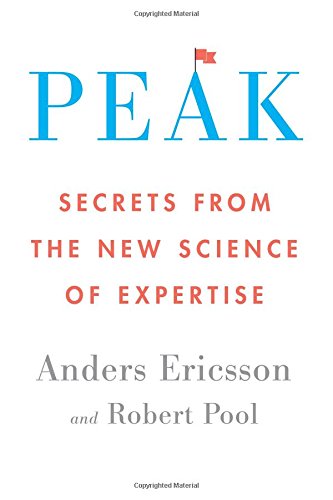

PEAK by Anders Erickson and Robert Pool, Top Ideas from the book,
Secrets from the new science of Expertise
Summary by Tylor Jones
Tylor Jones, Master Coach at turbomind.com.
Contact me Through WhatsApp or Telegram for a 45-Minute Free Coaching Session. I love helping people and Businesses become Exceptional. +507-6426-9450. keep updating this list regularly….
Why are some people so amazingly good at what they do?
This week we have an extraordinary book by Anders Ericsson and Robert Pool; PEAK, Secrets from the new science of Expertise. This is more than a book, it’s like an expertise encyclopedia. This book is the results of a lifetime of studying extraordinary performers.
It´s the result of 1000s of hours dedicated to studying excellence performance as well as excellence performers.
- Anders Ericsson(born 1947) is a Swedish psychologist and Conradi Eminent Scholar and Professor of Psychology at Florida State University, who is internationally recognized as a researcher in the psychological nature of expertise and human performance.
For over 30 years he has studied what type of practice works to make new and expanded capabilities, with a focus on those who have used practice to become among the best in the world at what they do.
It offers a new way of thinking about human potential. The reality is, we have far more power than we realize.
As Ericsson says, “The MOST EFFECTIVE and most powerful type of practice in any field work by harnessing the adaptability of the human body and brain to create, step by step, the ability to do things that were previously impossible”
Contrary to public believe, research has shown, that once a person has reached a level of “acceptable” performance, the additional years of “common” practice, don´t necessarily lead to improvement.
The doctor doing it for 5 years can be better than the one who has done it for 30 years. The fascinating reason is because “automated” activities gradually deteriorate IN THE ABSENCE OF DELIBERATE PRACTICE, in other words, in the absence of deliberate efforts to improve.
Deliberate practice is for anyone who dreams of doing something great, huge, way beyond his present capability.
There are no short cuts to success. There is no such thing as exceptional performance without an exceptional amount of time invested to improve that performance. It takes a minimum of about 10.000 hours and usually about a decade of time to become exceptionally god at something.
Poor performance can represent death. Essentially all experts take the same path to become extraordinary and that is deliberate practice.
————————————————
MY FAVORITE BOOKS ON MENTAL TRAINING AND MENTAL TOUGHNESS:
If you are looking for other exceptional books on mental training as well as mental toughness here are my favorites, the ones I have personally read:
- How Champions think by Dr Bob Rotella, https://www.turbomind.com/how-champions-think-by-dr-bob-rotella/
- An IRON WILL, by Orison Swet Mardin, https://www.turbomind.com/an-iron-will-what-all-great-men-have-in-comon/
- The Champion´s Mind, by Jim Afremov.
- With winning in Mind, by Lanny Bassham, https://www.turbomind.com/with-winning-in-mind-by-lanny-bassham/
- Chasing Excellence, by Ben Bergeron, https://www.turbomind.com/chasing-excellence-by-ben-bergeron/
- Mind Gym, by Gary Mack, https://www.turbomind.com/mind-gym-gary-mack-turbomind-book-club/
- Tom Coughlin, by him, https://www.turbomind.com/tom-coughlin-earn-the-right-to-win-best-ideas/
- No Limits, by Michael Phelps, https://www.turbomind.com/no-limits-by-michael-phelps-the-will-to-succeed-turbomind-com-book-club/
- Relentless by Tim Grover, https://www.turbomind.com/relentless-from-good-to-great-to-unstoppable-by-tim-s-grover-summary-by-miguel-de-la-fuente/
- Unbeatable Mind, by Mark Divine, https://www.turbomind.com/unbeatable-mind-mark-divine-turbomind-com-bookclub/
- Get the Life You Want, by Richard Bandler.
- Can´t Hurt Me, by David Goggins, https://www.turbomind.com/cant-hurt-me-by-david-goggins-turbomind-book-club/
- Make Your Bed, by Admiral William H- McRaven, https://www.turbomind.com/make-your-bed-by-admiral-william-h-mcraven-turbomind-bookclub/
- The 10X Rule by Grant Cardone, https://www.turbomind.com/the-10x-rule-the-difference-between-success-and-failure-book-summary/
- Discipline Equals Freedom. Jocko Willink, https://www.turbomind.com/discipline-equals-freedom-by-jocko-willink/
- RAFA, by Rafael Nadal, https://www.turbomind.com/rafa-by-rafael-nadalbook-summary/
- The 10X Rule, by Grant Cardone
I keep updating this list regularly….
——————————-
Here are the most important ideas I got from the book……You are not born with a fix reserve of potential; you expand your potential by using it. It expands by the various things you do through your life. Learning is not about reaching your full potential but about developing it.
- People who are the best at what they do, they are not gifted. They are good at what they do after practicing 1000s of hours. But not any practice, it´s DELIBERATE PRACTICE, also called Purposeful Practice. Extraordinary skills take time, but it takes constantly improving performance. Deliberate practice is a special sort of practice that leads to improvement. Deliberate practice is the gold standard for anyone in their fields.
- PURPOSEFUL PRACTICE HAS WELL-DEFINED SPECIFIC GOALS.
This practice helps improve because it has specific goals before you start the practice. “Play the piece all the way through at the proper speed without a mistake three times in a row”. It´s all about putting small steps together to reach a longer term goal. - Purposeful practice involves constant feedback. You have to know whether you are doing something right and improving or not. Without feedback from you or outsiders you cannot figure out what you need to improve. Positive feedback is one of the crucial factors in maintaining motivation.
- PURPOSE PRACTICES REQUIRES GETTING OUT OF YOUR COMFORT ZONE.
This is one of the most important aspects of PP. You are pushing yourself beyond what’s familiar and comfortable. IF YOU DON’T PUSH YOURSELF BEYOND YOUR COMFORT ZONE, YOU WILL NOT IMPROVE.If you keep playing the same song in exact the same way you will not improve, it doesn’t matter how many years you play it. This is a recipe for stagnation, not improvement. Getting out of your comfort zone means trying to do something your couldn´t do before. The best way to get past any barrier is TO COME AT IT FROM A DIFFERENT DIRECTION. This is why is so beneficial have a coach. Someone who is already familiar with the obstacles you are going through. - BRAIN´S NEOPLASTICITY:
Neuroscientists find that the brain and body adapt itself to the action you perform. London taxi drivers have the hippocampus more developed than regular people who are not engaged in spatial navigation. Regular training leads to changes in the parts of the brain that are challenged by the training. - The HUMAN BODY RESPONDS GREAT TO TRAINING.
It’s very adaptable like the brain.Most people live a very sedentary life with very little physical movement, so the body adapts itself to this type of life and it loses capabilities. It´s not age, it´s lack of movement.
The reason most people don’t possess extraordinary physical capabilities is not because they don’t have the capacity, but because they are satisfied to live a comfortable life governed by homeostasis, and they don´t make the effort to get out of this rut. They are happy with being “good enough”. A good enough life, with a good enough house, with a good enough mate, and a good enough kids.
Homeostasis is playing you the “Good enough” game, and it has home field advantage. Homeostasis takes you straight to death faster than anything. The great news is you can fight and win over homeostasis. It requires effort. If you want to become significantly better at something, YOU CAN. - MENTAL REPRESENTATIONS:
We use mental representations constantly. We are always making mental representations, images in our heads. A mental representation is a mental structure that corresponds to an object, an idea, a collection of information, or anything else, either concrete or abstract.
Much of deliberate practice involved developing more efficient mental representations, creating clearly mental pictures.
Research shows that investing countless of hours studying the masters in your profession, analyzing, predicting their next move, and if you get it wrong, go back and figure out what you missed, this type of practice is one of the strongest predictor of you becoming exceptional in that particular field.
What most clearly sets grand-masters apart (talking about chess) is their ability TO DEVICE MUCH BETTER POTENTIAL MOVES when they first examine the position. In other words, their mental representations.
The most important thing that set experts apart from other people is that years of practice have changed the neural circuit in their brains to produce HIGHLY SPECIALIZED MENTAL REPRESENTATIONS, which give improved memory, superior pattern recognition (experts see forest when others only see trees), and better problem solving.
This explains why the most successful quarterbacks train the most, but also WATCH the most time film.
Experienced rock climbers look over the entire wall and visualize the path they are going to take, seeing themselves moving from one place to the other. This ability to create this visual maps is what makes them better than average climbers.
Surgeons do something similar before surgeries.The main purpose of deliberate practice is to develop effective mental representations.
——————————————-
GREAT QUESTIONS:
-How do you take advantage of this gift and build abilities in your area of choice?
———————————-
GREAT STORIES:
TOP GUN SCHOOL:
The story about Vietnam War, 1968. Americans were losing a lot of planes and pilots in air dogfights against the Soviet-Trained North Vietnamese Mig fighter pilots. The ratio for the navy pilots had dropped down to about one-to-one. The U.S Navy had shot down nine MiGs, but lost ten of its own jets.
So the Navy decided it was time to improve their training. They established the “Top Gun School”. The goal was to train their pilots to be more effective and use many elements of deliberate practice.
They picked their best pilots to be the trainers. They would play the role of the enemy in air combat. They would flight planes similar to the MiGs. The only difference is instead of missiles they placed cameras that recorded everything.
In these practices, the pilots were expected to push the limits of themselves and their planes. To flight and combat on the EDGE OF FAILURE IN ORDER TO LEARN WHAT THEY WERE CAPABLE OF DOING.
And they develop one of the most important element of the training:
AFTER-ACTION REPORTS.
During these sessions the trainers would grill the students relentlessly, asking them over and over;
–What did you notice when you were up there?
-What actions did you take?
-Why did you choose to do that?
-What were your mistakes?
-Have could you have done better?
-What could you have done differently?
And the trainers would show the video and compare that data, make adjustments to improve and get better.
Next day, the pilots would go fight the trainers, come back and do the same drill with the trainers. This was done over and over again.
Over time, the students learn to ask themselves these question in real time. Slowly they internalized these lessons. They eliminated the necessity to think.
The results of this training were DRAMATIC. U.S forces had stopped their bombings in 1969. Over the next three years, from 1970 to 1973, U.S Navy pilots shot down an average of 12.5 North Vietnamese fighter planes for every U.S Navy plane that was lost. AMAZING!
This is what deliberate practice can do for you, or your business.
This training continued and during the first seven months of the First Gulf war, U.S pilots shot down 33 enemy planes for only one lost, making it the most dominant performance in aviation history.
————————-
CREATING CHESS CHAMPIONS:
The story of Hungarian psychologist Laszlo Polgár, who he and his wife embarked in the 1960 in an experiment that took the next 25 years. Lászlo studied hundreds of people who were regarded as geniuses and wanted to prove that geniuses are not born but they are made.
They had three girls, Susan, Sofia and Judit, and trained them to become world chess champions. Two of them became grandmasters. And one of them became a chess legend.
They home school their daughters in order to spend as much time as possible focusing on chess. It didn’t take long for them to become exceptional.
Susan won the first tournament at 4, and she went on to be the first woman to become grand master (same path that males take)
Judit became a grand master at 15, making her at the time, the youngest grand master, male or female, ever to reach that level. She was the number one ranked chess player in the world for 25 YEARS.
—————————-
TOP-IDEAS from the book:
It´s always about improving, becoming better. That is the idea of the book. If you don´t have a goal to get better, and you are going on automatic pilot, the natural tendency is to gradually deteriorate performance.
Purposeful practice is basically about getting out of your comfort zone, in a focused way, with a clear goal of improving something specific, and a way to monitor that improvement with positive feedback.
- “Automated” activities gradually deteriorate IN THE ABSENCE OF DELIBERATE PRACTICE, in other words, in the absence of deliberate efforts to improve.
- PURPOSEFUL PRACTICE HAS WELL-DEFINED SPECIFIC GOALS.
This practice helps improve because it has specific goals before you start the practice. “Play the piece all the way through at the proper speed without a mistake three times in a row”. - IF YOU DON’T PUSH YOURSELF BEYOND YOUR COMFORT ZONE, YOU WILL NOT IMPROVE.
- FIGHTING AGAINST HOMEOSTASIS and a “good enough” Life:
Push your body hard enough and for long enough, and it will respond by changing ways that MAKE THAT PUSH EASIER TO DO.
Your body will become a little stronger, a little faster and a little better. New muscle fibers and capillaries have grown and become more efficient, to handle comfortably the new levels of stress. However, here you go into your comfort zone again.
To keep the changes and improvements happening you HAVE TO KEEP PUSHING the body and mind out of the new comfort zone. Your body’s loves homeostasis.
Homeostasis is the tendency of organisms to auto-regulate and maintain their internal environment in a stable state. Your body loves your comfort zone. This is why is critical to stay JUST OUTSIDE Your Comfort zone. You need to continually push to keep the body´s compensatory changes coming. - The best way to do deliberate practice is by eliminating distractions, by scheduling a time you won´t be interrupted.
Take phones and communication out and FOCUS completely on getting BETTER.
Try to choose the same time regularly.
Identify those parts of the performance you want to improve. Focus on things you want to improve, improve by failing. This is hard work with a huge pay; Becoming the BEST you are Capable of Becoming. DEVELOPING YOUR POTENTIAL.
Tylor Jones, Master Coach at turbomind.com.
Contact me Through WhatsApp or Telegram for a 45-Minute Free Coaching Session. I love helping people and Businesses become Exceptional. +507-6426-9450. keep updating this list regularly….
————————————
15-Minutes per day will help you become the absolutely best you can become. You have a responsibility to honor pour potential. The biggest pain in life comes from not maximizing your Potential and doing what you know you were capable of doing, for you and others. You have been given the Most Extraordinary Gift; Your Life. Use it.






Facebook Comments